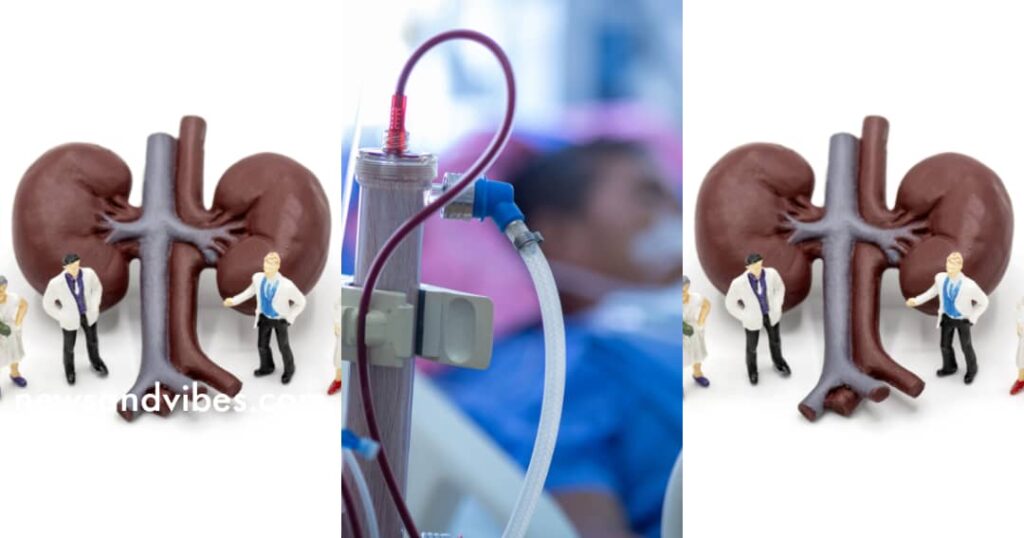The National Health Insurance Authority (NHIA) has announced that from June 2024, patients with renal or kidney failure will receive free dialysis treatments. To support this initiative, GHC4.4 million has been allocated to aid patients nationwide.
For the next six months, vulnerable dialysis patients, specifically those under 18 and over 60, will receive all eight monthly dialysis sessions free of charge through the National Health Insurance Scheme (NHIS). The NHIA estimates the monthly cost of this initiative at GHC329,952, totaling GHC2.3 million by the end of the year.
Patients aged 18 to 59 receiving treatment at the Komfo Anokye Teaching Hospital (KATH), Cape Coast Teaching Hospital (CCTH), Efia Niwanta Regional Hospital (ENRH), Ho Teaching Hospital (HTH), and Tamale Teaching Hospital (TTH) will be eligible for two free dialysis sessions per month. This is expected to cost GHC144,354 monthly, reaching GHC1.01 million by the year’s end.
Additionally, patients treated at the Korle Bu Teaching Hospital (KBTH) will receive a 50% subsidy for two dialysis sessions per month, reducing the cost to GHC491.00 per session. This exception is made possible by a philanthropic contribution of GHC380.00 per session for patients at KBTH. The estimated monthly cost for this category is GHC147,300, with a total of approximately GHC1.03 million by December 2024.
Funding for this initiative includes GHC2 million approved by Parliament in the NHIA’s 2024 Allocation Formula and an additional GHC2.4 million from the NHIA’s Corporate Social Responsibility (CSR) budget. The NHIA, celebrating its 20th anniversary, aims to support needy and vulnerable patients seeking dialysis treatment with these funds.
Kidney failure, also known as renal failure, is a medical condition in which the kidneys lose the ability to effectively filter waste products and excess fluids from the blood. This impairment can lead to the accumulation of waste products in the body, causing various health issues. Kidney failure can be acute or chronic:
Types of Kidney Failure
1. Acute Kidney Injury (AKI):
– Definition: A sudden and often temporary loss of kidney function.
– Causes: Can result from severe dehydration, blood loss, kidney infections, or the use of certain medications.
– Symptoms: Rapid onset of symptoms such as decreased urine output, swelling due to fluid retention, fatigue, shortness of breath, and confusion.
– Prognosis: Often reversible with prompt treatment, which may include addressing the underlying cause, medications, and dialysis in severe cases.
2. Chronic Kidney Disease (CKD):
– Definition: A gradual loss of kidney function over time, often progressing to end-stage renal disease (ESRD).
– Causes: Common causes include diabetes, high blood pressure, chronic glomerulonephritis, and polycystic kidney disease.
– Symptoms: Develop slowly and may include nausea, vomiting, loss of appetite, fatigue, weakness, sleep problems, changes in urine output, muscle cramps, swelling of feet and ankles, and persistent itching.
– Prognosis: CKD is often irreversible, and management focuses on slowing progression through lifestyle changes, medications, and eventually dialysis or kidney transplantation.
Risk Factors
– Diabetes: High blood sugar levels can damage the kidneys over time.
– Hypertension: High blood pressure can harm blood vessels in the kidneys.
– Age:The risk of kidney disease increases with age.
– Family History: A family history of kidney disease can increase risk.
– Ethnicity: Certain ethnic groups, including African Americans, Hispanics, and Native Americans, have a higher risk of developing kidney disease.
Diagnosis
– Blood Tests: Measure levels of waste products, such as creatinine and blood urea nitrogen (BUN).
– Urine Tests: Check for abnormalities such as protein or blood in the urine.
– Imaging Tests: Ultrasound or CT scans to assess kidney structure.
– Kidney Biopsy: In some cases, a small sample of kidney tissue is examined under a microscope.
Treatment
– Medications: To manage symptoms and underlying conditions like high blood pressure and diabetes.
– Lifestyle Changes: Dietary modifications, exercise, and quitting smoking.
– Dialysis: A procedure that artificially removes waste products and excess fluid from the blood when kidneys can no longer do so.
– Hemodialysis: Blood is filtered through a machine.
– Peritoneal Dialysis: Fluid is introduced into the abdomen to absorb waste products and then drained.
– Kidney Transplant: Surgical placement of a healthy kidney from a donor.
Prevention
– Control Blood Sugar: Effective management of diabetes.
– Manage Blood Pressure: Keeping hypertension under control.
– Healthy Diet: Reducing salt intake, avoiding excessive protein, and maintaining a healthy weight.
– Regular Check-ups: Monitoring kidney function in people at risk.

